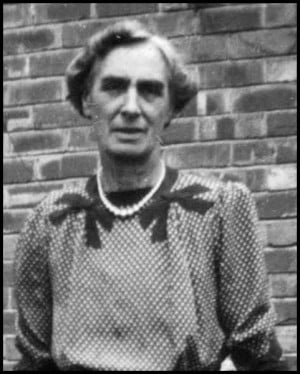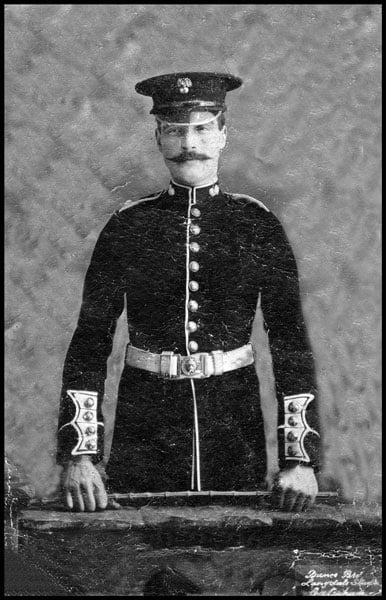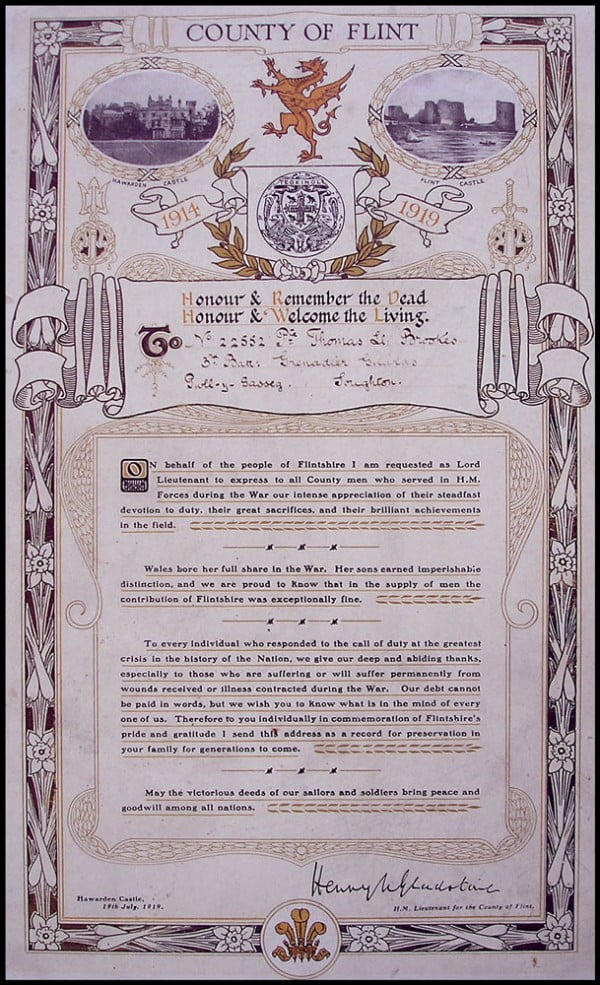Walter’s parents were Mary and William Brookes.
The father, William Brookes had been born in Shropshire in 1861 and had been ‘in -service’ since he was 10 years old. There is a vague story (that might or might not be true), that he met his future wife at Bodnant. She was Mary Munday, born in 1858 in Conwy where her parents collected toll money on the Conwy bridge – although her father (Llewelyn) also made a living by being a journeyman joiner.
By 1891, the couple William and Mary Brookes were living and working on the Penbedw Estate in Nannerch where William was a gamekeeper and they were raising a family. The census of that year records the family living in an estate house. William was 30 and a gamekeeper. His wife Mary was 33. Their listed children were Jemima 6, William 5, Mary Alice 3 and Walter 1 month
By 1901 they had moved to the estate owned by the Bankes family of Soughton Hall where William was made head gamekeeper. They lived in the Keepers Cottage, Pwll y Gaseg. This cottage is located at the beginning of Hall Lane (leading to Soughton Hall). The census of 1901 places them there. William was then 39 and Mary 43. Their listed children were Thomas 16 a Labourer to a Stonemason, William was 15 and an Assistant Keeper, Alice was 13, Walter 10 and Frank 5.
In 1910 a tragedy befell this family as the youngest and very beautiful daughter, Mary Alice died aged 22. The family believe that she died from consumption -TB.
The next census in 1911 records the family still at Pwll y Gaseg where William, 48 was The Gamekeeper on the Soughton Hall Estate. His wife of 27 years Mary was 53. The form states that she had given birth to 8 children but that 3 had died. ( We were told by a family member, that in fact Mary Brookes gave birth altogether to thirteen children although seven of them did not survive. She lost two sets of twins and three other babies.The children that survived were twins Jemima and Thomas (born 1885), William (born 1886), Mary Alice (born 1888) Walter (Born 1891) and Frank (born 1896). The grown up ‘children listed in the household in 1911 were William 25 , unemployed and Frank 15 was Assistant Keeper.
William’s work as a gamekeeper was arduous but much was expected too, of his wife such as providing meals for the under keepers on the estate. Mary Brookes had a particular talent for making potato whisky which was such fearsome stuff that the corks had to be tied down. It is said that certain doctors in the area called for bottles of this special brew – for strictly medicinal use – of course.
The census of 1911 places Walter Brookes aged 20, working as a Gardener at Cloverley Gardens in Calverhill Whitchurch, Shropshire. He was living in the ‘bothy’ (basic accommodation) with two other gardeners, Charles Wesley Sides was 23 and Richard Thomas was 20. It was said within the family that after he’d left there he received annual birthday gifts of boxes of violets from a mystery lady. Walter was a talented woodcarver and he made beautiful pieces of furniture.
Walter joined the army by enlisting in Mold on the 30th September 1914 and he entered his first theatre of war on the 19th July 1915. He served in the Machine Gun Section in both Italy and France. His placement as a gunner made a lot of sense because of course handling guns as a gamekeeper’s son was something he’d grown up with. He was wounded or gassed or became ill in France and shipped home to Wales and was sent to Caerynwch, a military hospital in Dolgellau where he died of pneumonia.
The very strong story that has passed down the family (but is not yet proved), is that when Mary Brookes heard that her son Walter had died, she borrowed a horse and flat cart and she drove it alone all the way to Dolgellau to collect Walter’s body to bring it home. That journey must have been unbelievably difficult emotionally and physically and was a remarkable and brave achievement by a strong, loving and determined mother.
The Register of Soldier’s Effects in which the army calculated monies owed to deceased soldiers, lists Walter and confirms that he died in Caerynwch Military Hospital. He was owed £41..3sh ..4d which was payed to his sole legatee. It was his mother Mary Brookes.
Walter’s brother Frank Brookes also died but he is not listed on the War Memorial in Sychdyn. Frank joined Kitchener’s army in September 1914. He served for 95 days with the Royal Welsh Fusiliers 10th Btn. where he was Private 15407. He was discharged. He re-enlisted on 12th December 1915 – this time he was Private 37650 of the 3rd Btn Royal Welsh Fusiliers. He served 88 days and was again discharged in consequence of being medically unfit. His poor health which included defective eyesight and chronic eczema meant that despite his two attempts to join the army, he never made it to a theatre of war. 1918 saw Britain and much of Europe in the grip of a deadly inflenza epidemic and Flintshire too had many many cases and many deaths. Frank Brookes was one of the casualties. He died at home, of this dreaded illness tragically only two weeks after Walter died. He had been a very popular and genial young man who had so wanted to serve his country and he became the tenth child to die from this one family.
Both of the other brothers served in the war and survived. Thomas (Private 22552 4th Grenadier Guards) saw active service in France and was wounded several times including at Ancre Battle 1916. He was also gassed in London in a Zepplin raid. Thomas went on to become the gamekeeper on the Soughton Hall Estate just like his father.William (Private 35994 of the 1st Loyal Lancashires) served in France. It is said that he later wrote for the Times newspaper on ‘country matters’.
Jemima grew up to become a Red Cross nurse. A family legend tells of how she once prepared her kitchen table for her own appendix operation. She obviously inherited her mother’s grit and courage.
Walter and Frank Brookes were buried in the family grave in Northop Churchyard alongside their sister Mary Alice.
Many thanks to family member Eveline Taylor for additional information and photographs. (Sadly there isn’t one of Walter).







